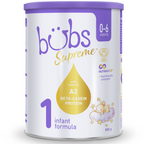How To Wean Off The Dummy
As parents, we understand that a dummy, also known as a pacifier or soother, can be a lifesaver when settling a fussy baby or helping them fall asleep. However, there comes a time when we need to consider weaning our little ones off this comfort source.
What does a dummy do?
A dummy, often made of silicone or rubber, is designed to provide babies with a sense of comfort and security. It can soothe them by satisfying their natural instinct to suck, especially during moments of distress or when falling asleep. Many parents introduce dummies to help their babies self-soothe and settle, giving both the child and the parents much-needed moments of peace. While a dummy can be an excellent tool for soothing babies, learning how to get rid of a dummy is a process that can present a challenge for many parents.
When is the best time to start weaning off the dummy?
There isn't a one-size-fits-all answer to getting rid of a dummy. The right time to wean off the dummy depends on your child's individual needs and your family dynamics. Some experts suggest that starting the process earlier, around 6 to 12 months, can make it easier. However, remember that every child is different. The most important thing is to approach this transition with patience and sensitivity, considering your child's emotional readiness.
Why is it important to ditch the dummy?
While dummies offer temporary comfort, long-term use can have potential downsides, so it's crucial to eventually practise ditching the dummy. Prolonged dummy use can affect speech development, as it may interfere with proper tongue and mouth movements crucial for speech formation. Additionally, constant sucking on a dummy can impact the alignment of teeth as they emerge, potentially leading to orthodontic issues. This is why it's important to consider weaning off the dummy.
Tips for weaning off the dummy:
- Communicate with your bub: Babies are more intelligent and more perceptive than we often give them credit for. When getting rid of the dummy, talk to your little one about the process, explaining that they are growing up and don't need it anymore. Encourage their understanding and cooperation.
- Get the timing right: Choose a time to start the dummy weaning process when there are no major disruptions in your child's routine. Avoid introducing this change during times of stress or when other significant life events are occurring.
- Gradually limit use: Instead of going cold turkey, ease your child into the transition. Begin by restricting dummy use to certain times of the day, such as nap times. As your child becomes accustomed to this change, you can gradually eliminate the dummy during other times.
- Offer an alternative comfort: A great tip for dummy weaning is to introduce a new comfort item, such as a soft toy or a special blanket, to replace the dummy. This can help redirect your child's attention and provide them with a new source of comfort.
- Avoid temptation: When ditching the dummy, keep dummies out of sight and reach during the weaning process and once it's complete. Avoid mentioning words associated with the dummy, too, as this can trigger cravings.
- Reward their progression: Positive reinforcement can work wonders when weaning off the dummy. Create a rewards system or set a specific date when the dummy will no longer be used, and celebrate their achievement with a special treat or incentive.
- Stay strong and be consistent: The dummy weaning process might come with moments of resistance or tears. Stay firm and consistent in your approach, reassuring your child they are safe and loved throughout the transition.
In the journey of parenting, there's no single right way to approach weaning off the dummy. Every child is unique, and the process might require adjustments along the way. Remember that this is a guide to help you navigate this transition. If you're concerned about your child's dummy use or the approach to best suit their needs, it's always a good idea to consult with a healthcare or medical professional.


